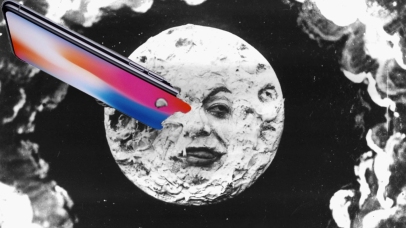
Like some indestructible colossus, structured narrative has triumphed over all other storytelling vehicles and methods as never before. The real heart of stories—themes, ideas, emotions, imagery— its genuine “content,” has been jackbooted into submissive obscurity by an over-glorification of the predictability, safety, and feats of its engineering. After the world recovered from the last global conflict, bold, adventurous filmmakers, many of who acquired their chops during the conflict, rigorously and unrelentingly pushed their medium’s inherent bounds and limitations As “story”‘s gospel seems to wane, an upstart medium is literally waiting in the wings.
Though its tech is nascent, VR seems destined to become the 21st century artform bar none. Content’s resurgence and reaction against form’s constrictions seems to be inevitable. The smackdown between artificial frames—produced by expert professionals—and experience—produced with seeming novices/laypersons—began at the turn of the last century, as reality TV sounded the death knell of scripted content. The latter clearly rebounded, but among the wonders of any new artform is its parentage. VR’s promise—and perils—explode rectangular confines to plunge participants, no longer passive “viewers,” headlong into experience itself, that literally messes with their heads. Makers’ powers are exponentially greater and more dangerous. The option of looking away or shielding one’s eyes is impossible.
What’s more is the remarkableness of VR’s déjà vu factor. Stereoscopes and kinetoscopes were once solitary and somewhat klunky, yet nevertheless popular solo pastimes. Shortly before the first talkie appeared, film executives balked at sound’s inevitability and the value of adjusting their infrastructure to accommodate it. Once talkies broke though, silents were almost immediately consigned to history’s archives, to be glimpsed fleetingly by enthusiasts and historians alone.
VR is currently at a juncture similar to those nascent sound films, with little if any headway within or saturation among either the general public or the audiovisual industry itself. But concurrently, the cinema seems bound for that same fate as the small frame has mostly trounced the large one. The current standoff between the two hinges almost entirely on the debt-fueled frenzy of the so-called “content providers” to outproduce one another. When, not if, that house of cards collapses, anything goes and the future will be up for grabs . . .
Filed under: divers, French film industry, US film industry, content providers, kinetoscope, stereoscope, talkies, virtual reality, vr, World War II



